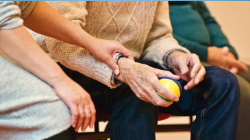
Home Assist Health is privileged to have so many caregivers caring for loved ones. From juggling chronic pain management, to the realities of memory loss and possible language deficits caused by dementia, we understand that it becomes your responsibility to do all you can to take care of every need and keep your loved one safe from harm.
Sometimes the best of intentions, like preparing dinner three nights a week, organizing medications in pill boxes or straightening up the house may leave a loved one unhappy. You see, sometimes your best intentions and planned energies may appear to limit a parent’s independence that crushes a confident spirit. Your mother or father may no longer see you as the caring son or daughter, but as overbearing usurper removing the roles they cherish.
Many caregivers struggle with finding a balance between doing too much and too little. Obviously if we do nothing, our loved one may struggle. However, doing too much for someone could also harm their sense of dignity. This is all the more complicated when a loved one’s capabilities change from day to day or even hour to hour. Look for an understanding that caregivers will not take over any tasks unless it is necessary for his or her care. Whether help is necessary or not is open to endless debate between earnest caregivers and proud care receivers.
How do we maintain our loved ones’ independence and morale, providing them the right amount of support to optimize their functioning? Here are some ideas:
Communicate and Plan. Even before your loved one clearly needs help, talk with them about how their capabilities may change as they age or due to their medical issues. Begin a conversation about how they might one day cope with diminished physical and cognitive abilities and how you might best support them.
Observe First. Be cautious before introducing change into an aging loved one’s life. Observe their behavior and functioning over time and then confirm your perceptions with others who also know them well before concluding that assistance is required at this time.
Guide Them Along. Steer them toward their strengths — for example, talking on the phone if they don’t have the eyesight or fine dexterity to write legibly or text, setting the table if they don’t have the organizational skills to cook a full-course meal, or remembering old times if they have lost short-term recall.
Empower. Tell your loved one that your job is to help them live as well as possible as they get older. Reassure them that the goal is to enable them to continue to do the things they still want to do. Remind them that, just as leaning on a cane might help someone walk farther than without it, you want to be someone to lean on. Emphasize that you may be the cane, but they are still traveling the path of their own life.
